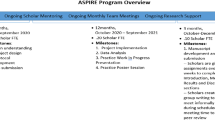Abstract
Background and Objectives
Family medicine (FM), a discipline that eschewed worshiping the ivory tower of research in favor of patient care, has struggled with its role in the world of scholarly activity. FM residencies mirror this conflict despite the Accreditation Council for Graduate Medical Education’s requirements for creating an environment of inquiry and scholarship. Because of this, the faculty within the Department of Family and Community Health (dFCH) at Marshall University changed its culture of scholarship.
Methods
A faculty-driven needs-based assessment of the department’s strengths and deficiencies for enhancing scholarship was conducted. A three-pronged approach of creating motivation, developing an infrastructure, and consolidating resources was created. This process was periodically re-evaluated and augmented. Departmental scholarly activity, defined as both publications and presentations, was tracked for an eight year period.
Results
Scholarly output increased by 483% (6 to 29) in year 1 and 10-fold by year 8 (6 to 60) from the pre-culture change baseline. This represents one- and eight-year increases for both publications (4 to 6 and 4 to 18 respectively) and presentations (2 to 23 and 2 to 42 respectively). Scholarly involvement became more widespread among faculty (n = 30) and increased linearly for residents (n = 19) and students (n = 13).
Conclusion
Through a series of needs-based interventions with consistent reanalysis, the dFCH changed its culture of scholarship. Understanding that other departments have similar competing interests to negotiate, the principles of creating motivation, developing research infrastructure, and consolidating resources could be successfully applied elsewhere.
Similar content being viewed by others
Data Availability
All present in the manuscript.
References
Gotler RS. Unfinished business: the role of research in family medicine. Ann Fam Med. 2019;17(1):70–6.
Bowman MA, Lucan SC, Rosenthal T, et al. Family research in the United States: from the late 1960’s into the future. Fam Med. 2017;49(4):289–95.
Ledford CW, Seehusen DA, Villagran MM, et al. Resident scholarship expectations and experiences: sources of uncertainty as barriers to success. J Grad Med Educ. 2013;5(4):564–9.
Koo J, Bains J, Collins MB, Dharamsi S. Residency research requirements and the CanMEDS-FM scholar role: perspectives of residents and recent graduates. Can Fam Physician. 2012;58(6):e330–6.
Grady EC, Roise A, Barr D, et al. Defining scholarly activity in graduate medical education. J Grad Med Educ. 2012;4(4):558–61.
Weidner A, Peterson LE, Mainous AG 3rd, Datta A, Ewigman B. The current state of research capacity in US family medicine departments. Fam Med. 2019 Feb;51(2):112–9.
Wood W, McCollum J, Kukreja P, et al. Graduate medical education scholarly activities initiatives: a systematic review and meta-analysis. BMC Med Educ. 2018;18(1):318.
Zimmerman R, Alweis R, Short A, et al. Interventions to increase research publications in graduate medical education trainees: a systemic review. Arch Med Sci. 2019;15(1):1–11.
Carek PJ. Integrating scholarly activity into residency training. Ann Fam Med. 2004;2(1):87–8.
Seehusen DA, Mainous AG, Chessman AW. Creating a centralized infrastructure to facilitate medical education research. Ann Fam Med. 2018;16(3):257–60.
Brown SR, Miser WF. Meeting scholarly activity requirements in a family medicine residency program. Ann Fam Med. 2017;15(5):487–8.
Carek PJ, Dickerson LM, Diaz VA, Steyer TE. Addressing the scholarly activity requirements for residents: one program’s solution. J Grad Med Educ. 2011;3(3):379–82.
Chase SM, Miller WL, Shaw E, et al. Meeting the challenge of practice quality improvement: a study of seven family medicine residency training practices. Acad Med. 2011;86(12):1583–9.
Carek PJ. Scholarly activity in family medicine residency programs: the need for skilled and successful faculty members. Ann Fam Med. 2004;2(2):186.
Penrose LL, Yeomans ER, Praderio C, Prien SD. An incremental approach to improving scholarly activity. J Grad Med Educ. 2012;4(4):496–9.
Mainous AG 3rd, Hueston WJ, Ye X, Bazell C. A comparison of family medicine research in research intense and less intense institutions. Arch Fam Med. 2000;9(10):1100–4.
Bourgeois JA, Hategan A, Azzam A. Competency-based medical education and scholarship: creating an active academic culture during residency. Perspect Med Educ. 2015;4:254–8.
Amgad M, Man Kin Tsui M, Liptrott SJ, Shash E. Medical student research: an integrated mixed- methods systematic review and meta-analysis. PLoS ONE. 2015;10(6):e0127470.
Pasarica M, Bailey M, Cendán JC. Increasing students’ publication productivity: could launching a university scientific journal be a catalyst. Cureus. 2019;11(1):e3953.
Katerndahl D. Evolution of the research collaboration network in a productive department. J Eval Clin Pract. 2012;18(1):195–201.
Katerndahl D. Co-evolution of departmental research collaboration and scholarly outcomes. J Eval Clin Pract. 2012;18(6):1241–7.
DeHaven MJ, Wilson GR, Murphree DD. Developing a research program in a community-based department of family medicine: one department’s experience. Fam Med. 1994;26(5):303–8.
Author information
Authors and Affiliations
Contributions
Both authors claim authorship.
Corresponding author
Ethics declarations
This project was given exempt status by the Marshall University IRB.
Conflict of Interest
The authors declare that they have no conflict of interest.
Code Availability
Not applicable
Additional information
Publisher’s Note
Springer Nature remains neutral with regard to jurisdictional claims in published maps and institutional affiliations.
Rights and permissions
About this article
Cite this article
Franks, A.M., Petrany, S.M. Building a Culture of Scholarship Within a Family Medicine Department: a Successful Eight-Year Journey of Incremental Interventions Following a Historical Perspective of Family Medicine Research. Med.Sci.Educ. 31, 75–80 (2021). https://doi.org/10.1007/s40670-020-01107-8
Accepted:
Published:
Issue Date:
DOI: https://doi.org/10.1007/s40670-020-01107-8




